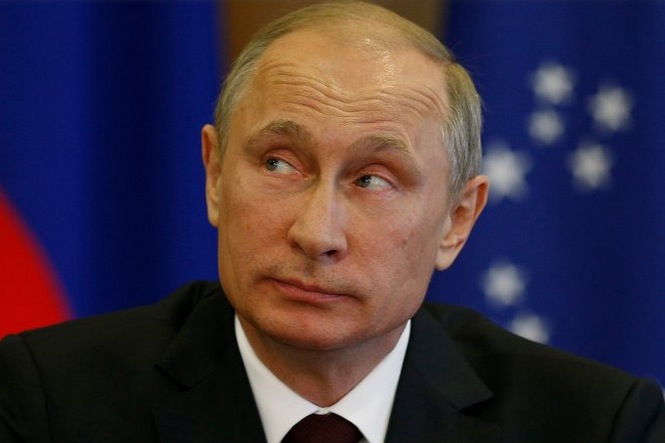Putin’s Useful (British) Idiots

During the Cold War the mass of the British people were, as George Orwell put it, at once both too sane and too stupid to accept any left-wing illusions about the Soviet Union.
But there has long been a certain muddleheadedness about totalitarianism on both the left and the right in Britain, with the most obvious example being British Conservative Prime Minister Neville Chamberlain, who was unable to grasp the fact that Adolf Hitler might actually believe the Nazi theories about blood and the ‘volk’ until it was too late. By then the Nazis had already annexed large swathes of Europe, and Britain was embarrassingly unprepared for war.
Today, that same sort of delusional thinking is evident in regard to Russia’s latest Tsar, Vladimir Putin. Comparing Putin’s aggression in eastern Ukraine to Hitler’s “protection” of Germans living in Czechoslovakia, as Hillary Clinton did a few months ago, is stretching things a bit. But Putin’s British apologists, on both the left and the right, are sticking faithfully to the script laid down by the man who had the dubious distinction of signing the Munich agreement.
A number of British right-wingers have long admired the Russian president for his unapologetic assertion of Russian power, his promotion of “traditional” values (see gay baiting) and his cynicism when dealing with “decadent” democratic governments. Alex Salmond and Nigel Farage, both leaders of burgeoning nationalist parties (Scottish and English respectively), have named the butcher of Chechnya as the one politician they “most admire,” with Farage describing Putin’s cynical manipulation of the conflict in Syria as “brilliant.”
There is also the prestigious Bruges Group, a self-described “neo-liberal think tank” made up of Conservative MPs and Lords, which claims to be “spearheading the intellectual battle” against the European Union. The group’s president is Norman Tebbit, Margaret Thatcher’s former Secretary of State for Education. What’s interesting is where the Bruges Group’s detestation of Europe has led it politically: straight into the arms of the Kremlin. According to a recent video put out by the group, the main problem in “the Ukraine” (as they revealingly call it) is not Russian-backed separatists but rather “E.U. meddling.”
This idea of a Russia that’s been treated badly extends deep into the Conservative press, where the Telegraph’s economics correspondent, Liam Halligan, has built almost an entire career on poorly disguised Putin apologia. Despite the fact that a majority of Ukraine’s 328 lawmakers voted on February 22 to remove former President Viktor Yanukovych from power due to his abandonment of office and the deaths of more than 80 protesters, according to Halligan Ukraine’s “democratic process” was in fact thwarted by “rock-throwing thugs.” As is perhaps predictable, Halligan is a regular pundit on RT, the Russian state’s English-language satellite channel, where he rallies against Western sanctions on a network that also gives a voice to Neo-Nazis, Holocaust deniers, and people who believe the Pope is part of a species of cone heads that secretly rule the world.
It would be unfair to single out the right; the left has its own share of useful idiots, largely made up of neo-Stalinists who see Putin as the new Man of Steel, and soft-headed liberals for whom the default response to any global crisis is to mutter about Western “double standards.” The Guardian columnist (and former editor of the paper’s comment pages), Seumus Milne, is a typical case of the former, and has blamed the violence in eastern Ukraine on “the disastrous Versailles-style break-up of the Soviet Union in the early 1990s.” In other words, any Ukrainian desire for self-determination can go to hell: Putin is right to be concerned about the loss of his “sphere of influence.” In Milne’s case the thread connecting Cold War moral bankruptcy to post-ideological moral bankruptcy is a direct one: this is a man who has built his career writing columns with titles like “Stalin’s Missing Millions,” meaning he probably didn’t really kill as many people in the Gulag as alleged.
Soon after Milne had put down on paper his sympathy for Tsar Vladimir, the Australian journalist John Pilger, another self-proclaimed “anti-imperialist,” took to the pages of the Guardian to—wait for it—denounce the opponents of Russian imperialism. Using fabricated quotes from alleged victims of “Ukrainian Nazis” pulled from Facebook pages that later vanished, Pilger blamed the entire crisis on “Washington’s planned seizure of Russia’s historic, legitimate, warm-water naval base in Crimea.”
The Guardian’s own Moscow correspondent, Shaun Walker, described the use of the quotes as “inexcusable.”
Finally, and in keeping with the suspicion that pacifism is little more than disguised power worship, the biggest organization in Britain dedicated to “peace,” the Stop the War Coalition, wrote in March that, “if we must pick a side, let it be Russia.”
Schooled in a parochial “common sense” view of the world, Neville Chamberlain viewed every political decision through the prism of the Birmingham Town Planning Committee where he spent his formative years. The assumption in every quarrel was that there was “something to be said for both sides”—why, then, shouldn’t the Germans of the Sudetenland join Germany if that was what they wished?
Putin is no Hitler, but today’s useful idiots, while lacking the stature of Chamberlain, are no less parochial and foolish. In some cases they are worse, for what they lack in power they make up in malevolence.
